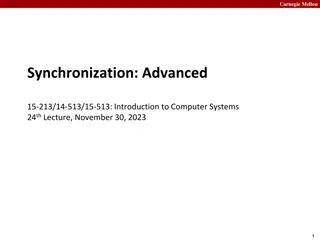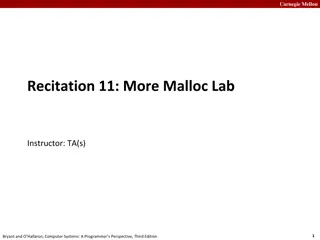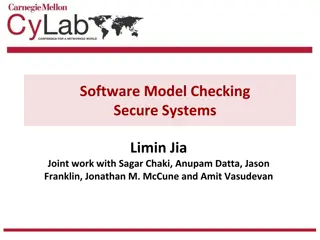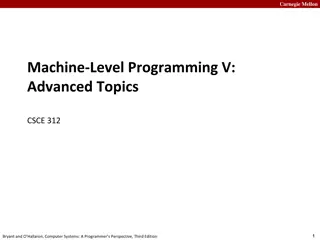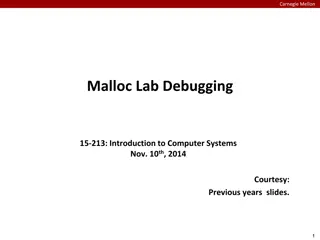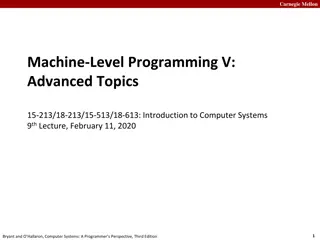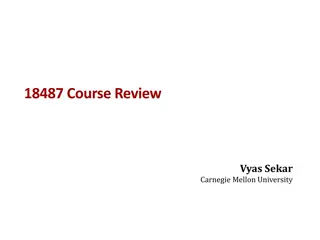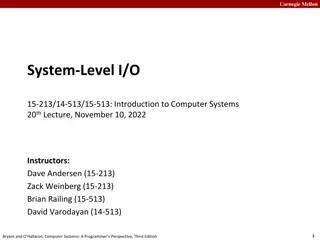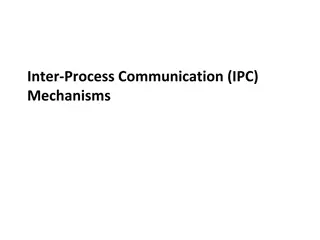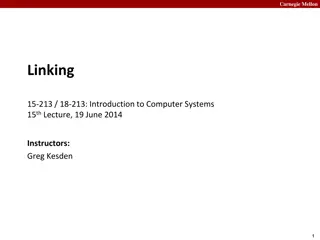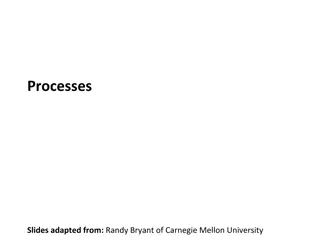Evolution of Compiler Optimization Techniques at Carnegie Mellon
Explore the rich history of compiler optimization techniques at Carnegie Mellon University, from the early days of machine code programming to the development of high-level languages like FORTRAN. Learn about key figures such as Grace Hopper, John Backus, and Fran Allen who revolutionized the field with their groundbreaking contributions. Discover the goals and challenges of compiler optimization and the enduring impact of these pioneers on modern computer systems.
Download Presentation

Please find below an Image/Link to download the presentation.
The content on the website is provided AS IS for your information and personal use only. It may not be sold, licensed, or shared on other websites without obtaining consent from the author. Download presentation by click this link. If you encounter any issues during the download, it is possible that the publisher has removed the file from their server.
E N D
Presentation Transcript
Carnegie Mellon Code Optimization 15-213/15-513/14-513: Introduction to Computer Systems 12thLecture, Feb 23, 2023 Instructors: Dave Andersen (15-213) Zack Weinberg (15-213) Brian Railing (15-513) 1 Bryant and O Hallaron, Computer Systems: A Programmer s Perspective, Third Edition
Carnegie Mellon Today Principles and goals of compiler optimization Examples of optimizations Obstacles to optimization Machine-dependent optimization Benchmark example 2 Bryant and O Hallaron, Computer Systems: A Programmer s Perspective, Third Edition
Carnegie Mellon Back in the Good Old Days, when the term "software" sounded funny and Real Computers were made out of drums and vacuum tubes, Real Programmers wrote in machine code. Not FORTRAN. Not RATFOR. Not, even, assembly language. Machine Code. Raw, unadorned, inscrutable hexadecimal numbers. Directly. The Story of Mel, a Real Programmer Ed Nather, 1983 3 Bryant and O Hallaron, Computer Systems: A Programmer s Perspective, Third Edition
Carnegie Mellon Rear Admiral Grace Hopper First person to find an actual bug (a moth) Invented first compiler in 1951 (precursor to COBOL) I decided data processors ought to be able to write their programs in English, and the computers would translate them into machine code 4 Bryant and O Hallaron, Computer Systems: A Programmer s Perspective, Third Edition
Carnegie Mellon John Backus Developed FORTRAN in 1957 for the IBM 704 Oldest machine- independent programming language still in use today Much of my work has come from being lazy. I didn't like writing programs, and so, when I was working on the IBM 701, I started work on a programming system to make it easier to write programs 5 Bryant and O Hallaron, Computer Systems: A Programmer s Perspective, Third Edition
Carnegie Mellon Fran Allen Pioneer of many optimizing compilation techniques Wrote a paper in 1966 that introduced the concept of the control flow graph, which is still central to compiler theory today First woman to win the ACM Turing Award 6 Bryant and O Hallaron, Computer Systems: A Programmer s Perspective, Third Edition
Carnegie Mellon Goals of compiler optimization Minimize number of instructions Don t do calculations more than once Don t do unnecessary calculations at all Avoid slow instructions (multiplication, division) Avoid waiting for memory Keep everything in registers whenever possible Access memory in cache-friendly patterns Load data from memory early, and only once Avoid branching Don t make unnecessary decisions at all Make it easier for the CPU to predict branch destinations Unroll loops to spread cost of branches over more instructions 7 Bryant and O Hallaron, Computer Systems: A Programmer s Perspective, Third Edition
Carnegie Mellon Limits to compiler optimization Generally cannot improve algorithmic complexity Only constant factors, but those can be worth 10x or more Must not cause any change in program behavior Programmer may not care about edge case behavior, but compiler does not know that Exception: language may declare some changes acceptable Often only analyze one function at a time Whole-program analysis ( LTO ) expensive but gaining popularity Exception: inlining merges many functions into one Tricky to anticipate run-time inputs Profile-guided optimization can help with common case, but Worst case performance can be just as important as normal Especially for code exposed to malicious input (e.g. network servers) 8 Bryant and O Hallaron, Computer Systems: A Programmer s Perspective, Third Edition
Carnegie Mellon Two kinds of optimizations entry Local optimizations work inside a single basic block Constant folding, strength reduction, dead code elimination, (local) CSE, setup Easy? easy complex Global optimizations process the entire control flow graph of a function Loop transformations, code motion, (global) CSE, loop Done? exit 9 Bryant and O Hallaron, Computer Systems: A Programmer s Perspective, Third Edition
Carnegie Mellon Today Principles and goals of compiler optimization Examples of optimizations Obstacles to optimization Machine-dependent optimization Benchmark example 10 Bryant and O Hallaron, Computer Systems: A Programmer s Perspective, Third Edition
Carnegie Mellon Next several slides done live https://godbolt.org/z/Es5s8qsvj Go to Godbolt (the compiler explorer) to play around with C and the resulting assembly generated under different compiler optimizations (change the flag from O3 to Og, etc. to see more or less aggressive optimization). If you missed class, aof the concepts we explored during the live demo are explained in the next few slides, so peek at them and then try playing with the compiler explorer! 11 Bryant and O Hallaron, Computer Systems: A Programmer s Perspective, Third Edition
Carnegie Mellon Constant folding Do arithmetic in the compiler long mask = 0xFF << 8; long mask = 0xFF00; Any expression with constant inputs can be folded Might even be able to remove library calls size_t namelen = strlen("Harry Bovik"); size_t namelen = 11; 12 Bryant and O Hallaron, Computer Systems: A Programmer s Perspective, Third Edition
Carnegie Mellon Dead code elimination Don t emit code that will never be executed if (0) { puts("Kilroy was here"); } if (1) { puts("Only bozos on this bus"); } Don t emit code whose result is overwritten x = 23; x = 42; These may look silly, but... Can be produced by other optimizations Assignments to x might be far apart 13 Bryant and O Hallaron, Computer Systems: A Programmer s Perspective, Third Edition
Carnegie Mellon Common subexpression elimination Factor out repeated calculations, only do them once norm[i] = v[i].x*v[i].x + v[i].y*v[i].y; elt = &v[i]; x = elt->x; y = elt->y; norm[i] = x*x + y*y; 14 Bryant and O Hallaron, Computer Systems: A Programmer s Perspective, Third Edition
Carnegie Mellon Code motion Move calculations out of a loop Only valid if every iteration would produce same result long j; for (j = 0; j < n; j++) a[n*i+j] = b[j]; long j; int ni = n*i; for (j = 0; j < n; j++) a[ni+j] = b[j]; 15 Bryant and O Hallaron, Computer Systems: A Programmer s Perspective, Third Edition
Carnegie Mellon Inlining Copy body of a function into its caller(s) Can create opportunities for many other optimizations Can make code much bigger and therefore slower (size; i-cache) int func(int y) { int pred(int x) { if (x == 0) return 0; else return x - 1; } int tmp; if (y == 0) tmp = 0; else tmp = y - 1; if (0 == 0) tmp += 0; else tmp += 0 - 1; if (y+1 == 0) tmp += 0; else tmp += (y + 1) - 1; return tmp; int func(int y) { return pred(y) + pred(0) + pred(y+1); } } 16 Bryant and O Hallaron, Computer Systems: A Programmer s Perspective, Third Edition
Carnegie Mellon Inlining Copy body of a function into its caller(s) Can create opportunities for many other optimizations Can make code much bigger and therefore slower int func(int y) { int pred(int x) { if (x == 0) return 0; else return x - 1; } int tmp; if (y == 0) tmp = 0; else tmp = y - 1; if (0 == 0) tmp += 0; else tmp += 0 - 1; if (y+1 == 0) tmp += 0; else tmp += (y + 1) - 1; return tmp; int func(int y) { return pred(y) + pred(0) + pred(y+1); } } Always true Does nothing Can constant fold 17 Bryant and O Hallaron, Computer Systems: A Programmer s Perspective, Third Edition
Carnegie Mellon Inlining Copy body of a function into its caller(s) Can create opportunities for many other optimizations Can make code much bigger and therefore slower int func(int y) { int func(int y) { int tmp = 0; int tmp; if (y != 0) tmp = y - 1; if (y == 0) tmp = 0; else tmp = y - 1; if (0 == 0) tmp += 0; else tmp += 0 - 1; if (y != -1) tmp += y; if (y+1 == 0) tmp += 0; else tmp += (y + 1) - 1; return tmp; return tmp; } } 18 Bryant and O Hallaron, Computer Systems: A Programmer s Perspective, Third Edition
Carnegie Mellon Today Principles and goals of compiler optimization Examples of optimizations Obstacles to optimization Machine-dependent optimization Benchmark example 19 Bryant and O Hallaron, Computer Systems: A Programmer s Perspective, Third Edition
Carnegie Mellon Memory Aliasing /* Sum rows of n X n matrix a and store in vector b. */ void sum_rows1(double *a, double *b, long n) { long i, j; for (i = 0; i < n; i++) { b[i] = 0; for (j = 0; j < n; j++) b[i] += a[i*n + j]; } } movq $0, (%rsi) pxor %xmm0, %xmm0 .L4: addsd (%rdi), %xmm0 movsd %xmm0, (%rsi) addq $8, %rdi cmpq %rcx, %rdi jne .L4 Code updates b[i] on every iteration Why couldn t compiler optimize this away? 20 Bryant and O Hallaron, Computer Systems: A Programmer s Perspective, Third Edition
Carnegie Mellon Memory Aliasing /* Sum rows of n X n matrix a and store in vector b. */ void sum_rows1(double *a, double *b, long n) { long i, j; for (i = 0; i < n; i++) { b[i] = 0; for (j = 0; j < n; j++) b[i] += a[i*n + j]; } } Value of B: double A[9] = { 0, 1, 2, 4, 8, 16}, 32, 64, 128}; double A[9] = { 0, 1, 2, { 0, 1, 2, { 0, 1, 2, { 0, 1, 2, { 0, 1, 2, { 0, 1, 2, { 0, 1, 2, { 0, 1, 2, { 0, 1, 2, { 0, 1, 2, double A[9] = double A[9] = double A[9] = double A[9] = double A[9] = double A[9] = double A[9] = double A[9] = double A[9] = double A[9] = { 0, 1, 2, 0, 8, 16}, 1, 8, 16}, 3, 8, 16}, 3, 0, 16}, 3, 3, 16}, 3, 6, 16}, 3, 22, 16}, 3, 22, 0}, 3, 22, 32}, 3, 22, 96}, 3, 22, 224}, double A[9] = { 0, 1, 2, 0, 8, 16}, 32, 64, 128}; 32, 64, 128}; 32, 64, 128}; 32, 64, 128}; 32, 64, 128}; 32, 64, 128}; 32, 64, 128}; 32, 64, 128}; 32, 64, 128}; 32, 64, 128}; 32, 64, 128}; 32, 64, 128}; init: [4, 8, 16] i = 0: [3, 8, 16] i = 1: [3, 22, 16] double B[3] = A+3; i = 2: [3, 22, 224] sum_rows1(A, B, 3); Code updates b[i] on every iteration Must consider possibility that these updates will affect program behavior 21 Bryant and O Hallaron, Computer Systems: A Programmer s Perspective, Third Edition
Carnegie Mellon Avoiding Aliasing Penalties /* Sum rows of n X n matrix a and store in vector b. */ void sum_rows2(double *a, double *b, long n) { long i, j; for (i = 0; i < n; i++) { double val = 0; for (j = 0; j < n; j++) val += a[i*n + j]; b[i] = val; } } pxor %xmm0, %xmm0 .L4: addsd (%rdi), %xmm0 addq $8, %rdi cmpq %rax, %rdi jne .L4 movsd %xmm0, (%rsi) Use a local variable for intermediate results 22 Bryant and O Hallaron, Computer Systems: A Programmer s Perspective, Third Edition
Carnegie Mellon Can t move function calls out of loops void lower_quadratic(char *s) { size_t i; for (i = 0; i < strlen(s); i++) if (s[i] >= 'A' && s[i] <= 'Z') s[i] += 'a' - 'A'; } void lower_still_quadratic(char *s) { size_t i, n = strlen(s); for (i = 0; i < n; i++) if (s[i] >= 'A' && s[i] <= 'Z') { s[i] += 'a' - 'A'; n = strlen(s); } } void lower_linear(char *s) { size_t i, n = strlen(s); for (i = 0; i < n; i++) if (s[i] >= 'A' && s[i] <= 'Z') s[i] += 'a' - 'A'; } Lots more examples of this kind of bug: accidentallyquadratic.tumblr.com 23 Bryant and O Hallaron, Computer Systems: A Programmer s Perspective, Third Edition
Carnegie Mellon Can t move function calls out of loops void lower_quadratic(char *s) { size_t i; for (i = 0; i < strlen(s); i++) if (s[i] >= 'A' && s[i] <= 'Z') s[i] += 'a' - 'A'; } every iteration after each change void lower_still_quadratic(char *s) { size_t i, n = strlen(s); for (i = 0; i < n; i++) if (s[i] >= 'A' && s[i] <= 'Z') { s[i] += 'a' - 'A ; n = strlen(s); } } void lower_linear(char *s) { size_t i, n = strlen(s); for (i = 0; i < n; i++) if (s[i] >= 'A' && s[i] <= 'Z') s[i] += 'a' - 'A'; } 24 Bryant and O Hallaron, Computer Systems: A Programmer s Perspective, Third Edition
Carnegie Mellon Quiz https://canvas.cmu.edu/courses/30386/quizzes 25 Bryant and O Hallaron, Computer Systems: A Programmer s Perspective, Third Edition
Carnegie Mellon Strength Reduction X = I * 4 x = I << 2 Replace expensive operations with cheaper ones 26 Bryant and O Hallaron, Computer Systems: A Programmer s Perspective, Third Edition
Carnegie Mellon Today Principles and goals of compiler optimization Examples of optimizations Obstacles to optimization Machine-dependent optimization Benchmark example 27 Bryant and O Hallaron, Computer Systems: A Programmer s Perspective, Third Edition
Carnegie Mellon Modern CPU Design Instruction Control Address Fetch Control Retirement Unit Register File Instruction Cache Instructions Instruction Decode Operations Register Updates Prediction OK? Functional Branch Arith Arith Arith Load Store Units Operation Results Addr. Addr. Data Data Data Cache Execution 28 Bryant and O Hallaron, Computer Systems: A Programmer s Perspective, Third Edition
Carnegie Mellon Branches Are A Challenge Instruction Control Unit must work well ahead of Execution Unit to generate enough operations to keep EU busy 404663: mov 404668: cmp 40466b: jge 40466d: mov $0x0,%eax (%rdi),%rsi 404685 0x8(%rdi),%rax Executing Need to know which way to branch . . . 404685: repz retq If the CPU has to wait for the result of the cmp before continuing to fetch instructions, may waste tens of cycles doing nothing! 29 Bryant and O Hallaron, Computer Systems: A Programmer s Perspective, Third Edition
Carnegie Mellon Branch Prediction Guess which way branch will go Begin executing instructions at predicted position But don t actually modify register or memory data 404663: mov 404668: cmp 40466b: jge 40466d: mov $0x0,%eax (%rdi),%rsi 404685 0x8(%rdi),%rax Predict Taken . . . Continue Fetching Here 404685: repz retq 30 Bryant and O Hallaron, Computer Systems: A Programmer s Perspective, Third Edition
Carnegie Mellon Branch Prediction Through Loop Assume array length = 100 401029: mulsd (%rdx),%xmm0,%xmm0 40102d: add $0x8,%rdx 401031: cmp %rax,%rdx 401034: jne 401029 i = 98 Predict Taken (OK) 401029: mulsd (%rdx),%xmm0,%xmm0 40102d: add $0x8,%rdx 401031: cmp %rax,%rdx 401034: jne 401029 i = 99 Predict Taken (Oops) 401029: mulsd (%rdx),%xmm0,%xmm0 40102d: add $0x8,%rdx 401031: cmp %rax,%rdx 401034: jne 401029 Executed Read invalid location i = 100 401029: mulsd (%rdx),%xmm0,%xmm0 40102d: add $0x8,%rdx 401031: cmp %rax,%rdx 401034: jne 401029 Fetched i = 101 31 Bryant and O Hallaron, Computer Systems: A Programmer s Perspective, Third Edition
Carnegie Mellon Branch Misprediction Invalidation Assume array length = 100 401029: mulsd (%rdx),%xmm0,%xmm0 40102d: add $0x8,%rdx 401031: cmp %rax,%rdx 401034: jne 401029 i = 98 Predict Taken (OK) 401029: mulsd (%rdx),%xmm0,%xmm0 40102d: add $0x8,%rdx 401031: cmp %rax,%rdx 401034: jne 401029 i = 99 Predict Taken (Oops) 401029: mulsd (%rdx),%xmm0,%xmm0 40102d: add $0x8,%rdx 401031: cmp %rax,%rdx 401034: jne 401029 i = 100 Invalidate 401029: mulsd (%rdx),%xmm0,%xmm0 40102d: add $0x8,%rdx 401031: cmp %rax,%rdx 401034: jne 401029 i = 101 32 Bryant and O Hallaron, Computer Systems: A Programmer s Perspective, Third Edition
Carnegie Mellon Branch Misprediction Recovery 401029: mulsd (%rdx),%xmm0,%xmm0 40102d: add $0x8,%rdx 401031: cmp %rax,%rdx 401034: jne 401029 401036: jmp 401040 . . . 401040: movsd %xmm0,(%r12) i = 99 Definitely not taken Reload Pipeline Performance Cost Multiple clock cycles on modern processor Can be a major performance limiter 33 Bryant and O Hallaron, Computer Systems: A Programmer s Perspective, Third Edition
Carnegie Mellon Branch Prediction Numbers A simple heuristic: Backwards branches are often loops, so predict taken Forwards branches are often ifs, so predict not taken >95% prediction accuracy just with this! Fancier algorithms track behavior of each branch Subject of ongoing research 2011 record (https://www.jilp.org/jwac-2/program/JWAC-2- program.htm): 34.1 mispredictions per 1000 instructions Current research focuses on the remaining handful of impossible to predict branches (strongly data-dependent, no correlation with history) e.g. https://hps.ece.utexas.edu/pub/PruettPatt_BranchRunahead.pdf 34 Bryant and O Hallaron, Computer Systems: A Programmer s Perspective, Third Edition
Carnegie Mellon Optimizing for Branch Prediction .Loop: movzbl 0(%rbp,%rbx), %edx leal -65(%rdx), %ecx cmpb $25, %cl ja .Lskip addl $32, %edx movb %dl, 0(%rbp,%rbx) .Lskip: addl $1, %rbx cmpq %rax, %rbx jb .Loop Reduce # of branches Transform loops Unroll loops Use conditional moves Not always a good idea Make branches predictable Sort data https://stackoverflow.com/questions/11227809 Avoid indirect branches .Loop: movzbl 0(%rbp,%rbx), %edx movl %edx, %esi leal -65(%rdx), %ecx addl $32, %edx cmpb $25, %cl cmova %esi, %edx movb %dl, 0(%rbp,%rbx) addl $1, %rbx cmpq %rax, %rbx jb .Loop Memory write now unconditional! function pointers virtual methods 35 Bryant and O Hallaron, Computer Systems: A Programmer s Perspective, Third Edition
Carnegie Mellon Loop Unrolling Amortize cost of loop condition by duplicating body Creates opportunities for CSE, code motion, scheduling Prepares code for vectorization Can hurt performance by increasing code size for (size_t i = 0; i < nelts; i++) { A[i] = B[i]*k + C[i]; } for (size_t i = 0; i < nelts - 4; i += 4) { A[i ] = B[i ]*k + C[i ]; A[i+1] = B[i+1]*k + C[i+1]; A[i+2] = B[i+2]*k + C[i+2]; A[i+3] = B[i+3]*k + C[i+3]; } When would this change be incorrect? 36 Bryant and O Hallaron, Computer Systems: A Programmer s Perspective, Third Edition
Carnegie Mellon Scheduling Rearrange instructions to make it easier for the CPU to keep all functional units busy For instance, move all the loads to the top of an unrolled loop Now maybe it s more obvious why we need lots of registers for (size_t i = 0; i < nelts - 4; i += 4) { A[i ] = B[i ]*k + C[i ]; A[i+1] = B[i+1]*k + C[i+1]; A[i+2] = B[i+2]*k + C[i+2]; A[i+3] = B[i+3]*k + C[i+3]; } for (size_t i = 0; i < nelts - 4; i += 4) { B0 = B[i]; B1 = B[i+1]; B2 = B[i+2]; B3 = B[i+3]; C0 = C[i]; C1 = C[i+1]; C2 = C[i+2]; C3 = B[i+3]; A[i ] = B0*k + C0; A[i+1] = B1*k + C1; A[i+2] = B2*k + C2; A[i+3] = B3*k + C3; } When would this change be incorrect? 37 Bryant and O Hallaron, Computer Systems: A Programmer s Perspective, Third Edition
Carnegie Mellon Today Principles and goals of compiler optimization Examples of optimizations Obstacles to optimization Machine-dependent optimization Benchmark example 38 Bryant and O Hallaron, Computer Systems: A Programmer s Perspective, Third Edition
Carnegie Mellon Benchmark Example: Data Type for Vectors /* data structure for vectors */ typedef struct{ size_t len; data_t *data; } vec; len data 1 len-1 0 /* retrieve vector element and store at val */ int get_vec_element (*vec v, size_t idx, data_t *val) { if (idx >= v->len) return 0; *val = v->data[idx]; return 1; } Data Types Use different declarations for data_t int long float double 39 Bryant and O Hallaron, Computer Systems: A Programmer s Perspective, Third Edition
Carnegie Mellon Benchmark Computation void combine1(vec_ptr v, data_t *dest) { long int i; *dest = IDENT; for (i = 0; i < vec_length(v); i++) { data_t val; get_vec_element(v, i, &val); *dest = *dest OP val; } } Compute sum or product of vector elements Data Types Use different declarations for data_t int long float double Operations Use different definitions of OP and IDENT +/0 */1 40 Bryant and O Hallaron, Computer Systems: A Programmer s Perspective, Third Edition
Carnegie Mellon Cycles Per Element (CPE) Convenient way to express performance of program that operates on vectors or lists Length = n In our case: CPE = cycles per OP Cycles = CPE*n + Overhead CPE is slope of line 2500 2000 psum1 Slope = 9.0 1500 Cycles 1000 psum2 Slope = 6.0 500 0 0 50 100 150 200 Elements 41 Bryant and O Hallaron, Computer Systems: A Programmer s Perspective, Third Edition
Carnegie Mellon Benchmark Performance void combine1(vec_ptr v, data_t *dest) { long int i; *dest = IDENT; for (i = 0; i < vec_length(v); i++) { data_t val; get_vec_element(v, i, &val); *dest = *dest OP val; } } Compute sum or product of vector elements Method Integer Double FP Operation Add Mult Add Mult Combine1 unoptimized 22.68 20.02 19.98 20.18 Combine1 O1 10.12 10.12 10.17 11.14 Combine1 O3 4.5 4.5 6 7.8 Results in CPE (cycles per element) 42 Bryant and O Hallaron, Computer Systems: A Programmer s Perspective, Third Edition
Carnegie Mellon Basic Optimizations void combine4(vec_ptr v, data_t *dest) { long i; long length = vec_length(v); data_t *d = get_vec_start(v); data_t t = IDENT; for (i = 0; i < length; i++) t = t OP d[i]; *dest = t; } Move vec_length out of loop Avoid bounds check on each cycle Accumulate in temporary 43 Bryant and O Hallaron, Computer Systems: A Programmer s Perspective, Third Edition
Carnegie Mellon Effect of Basic Optimizations void combine4(vec_ptr v, data_t *dest) { long i; long length = vec_length(v); data_t *d = get_vec_start(v); data_t t = IDENT; for (i = 0; i < length; i++) t = t OP d[i]; *dest = t; } Method Integer Double FP Operation Add Mult Add Mult Combine1 unoptimized 22.68 20.02 19.98 20.18 Combine1 O1 10.12 10.12 10.17 11.14 Combine1 O3 4.5 4.5 6 7.8 Combine4 1.27 3.01 3.01 5.01 44 Bryant and O Hallaron, Computer Systems: A Programmer s Perspective, Third Edition
Carnegie Mellon Loop Unrolling void unroll2a_combine(vec_ptr v, data_t *dest) { long length = vec_length(v); long limit = length-1; data_t *d = get_vec_start(v); data_t x0 = IDENT; data_t x1 = IDENT; long i; /* Combine 2 elements at a time */ for (i = 0; i < limit; i+=2) { x0 = x0 OP d[i]; x1 = x1 OP d[i+1]; } /* Finish any remaining elements */ for (; i < length; i++) { x0 = x0 OP d[i]; } *dest = x0 OP x1; } 45 Bryant and O Hallaron, Computer Systems: A Programmer s Perspective, Third Edition
Carnegie Mellon Loop Unrolled Assembly Remember modern CPU designs Multiple functional units So how many cycles should this loop take to execute? .L3: imulq (%rdx), %rcx addq $16, %rdx imulq -8(%rdx), %rdi cmpq %r8, %rdx jne .L3 46 Bryant and O Hallaron, Computer Systems: A Programmer s Perspective, Third Edition
Carnegie Mellon Effect of Loop Unrolling Method Integer Double FP Operation Add Mult Add Mult Combine1 unoptimized 22.68 20.02 19.98 20.18 Combine1 O1 10.12 10.12 10.17 11.14 Combine1 O3 4.5 4.5 6 7.8 Combine4 1.27 3.01 3.01 5.01 Unroll 0.81 1.51 1.51 2.51 Multiple instructions every cycle! 47 Bryant and O Hallaron, Computer Systems: A Programmer s Perspective, Third Edition
Carnegie Mellon Going Further Compiler optimizations are an easy gain 20 CPE down to 3-5 CPE With careful hand tuning and computer architecture knowledge 4-16 elements per cycle Newest compilers are closing this gap 48 Bryant and O Hallaron, Computer Systems: A Programmer s Perspective, Third Edition
Carnegie Mellon Summary: Getting High Performance Good compiler and flags Don t do anything sub-optimal Watch out for hidden algorithmic inefficiencies Write compiler-friendly code Watch out for optimization blockers: procedure calls & memory references Look carefully at innermost loops (where most work is done) Tune code for machine Exploit instruction-level parallelism Avoid unpredictable branches Make code cache friendly 49 Bryant and O Hallaron, Computer Systems: A Programmer s Perspective, Third Edition


